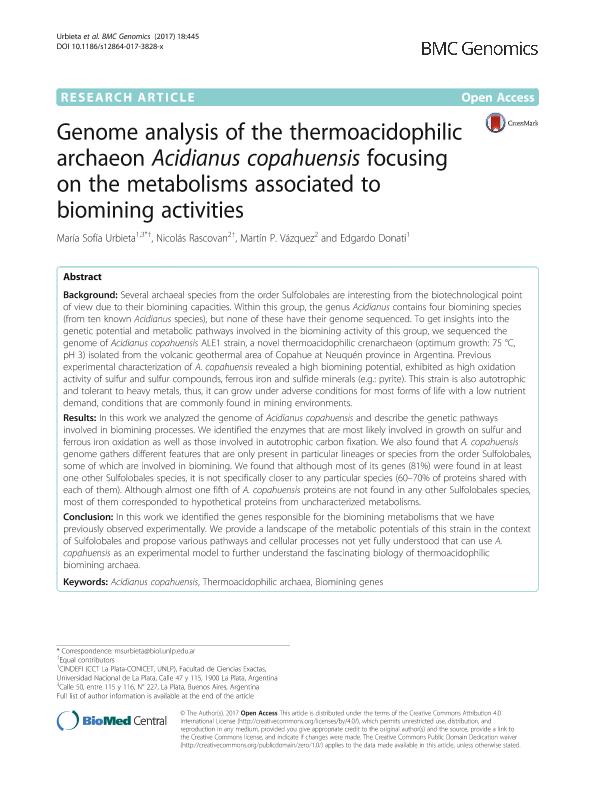Mostrar el registro sencillo del ítem
dc.contributor.author
Urbieta, María Sofía

dc.contributor.author
Rascovan, Nicolas

dc.contributor.author
Vazquez, Martin Pablo

dc.contributor.author
Donati, Edgardo Ruben

dc.date.available
2018-06-14T13:46:59Z
dc.date.issued
2017-06
dc.identifier.citation
Urbieta, María Sofía; Rascovan, Nicolas; Vazquez, Martin Pablo; Donati, Edgardo Ruben; Genome analysis of the thermoacidophilic archaeon Acidianus copahuensis focusing on the metabolisms associated to biomining activities; BioMed Central; BMC Genomics; 18; 1; 6-2017; 1-14
dc.identifier.issn
1471-2164
dc.identifier.uri
http://hdl.handle.net/11336/48598
dc.description.abstract
Background: Several archaeal species from the order Sulfolobales are interesting from the biotechnological point of view due to their biomining capacities. Within this group, the genus Acidianus contains four biomining species (from ten known Acidianus species), but none of these have their genome sequenced. To get insights into the genetic potential and metabolic pathways involved in the biomining activity of this group, we sequenced the genome of Acidianus copahuensis ALE1 strain, a novel thermoacidophilic crenarchaeon (optimum growth: 75 °C, pH 3) isolated from the volcanic geothermal area of Copahue at Neuquén province in Argentina. Previous experimental characterization of A. copahuensis revealed a high biomining potential, exhibited as high oxidation activity of sulfur and sulfur compounds, ferrous iron and sulfide minerals (e.g.: pyrite). This strain is also autotrophic and tolerant to heavy metals, thus, it can grow under adverse conditions for most forms of life with a low nutrient demand, conditions that are commonly found in mining environments. Results: In this work we analyzed the genome of Acidianus copahuensis and describe the genetic pathways involved in biomining processes. We identified the enzymes that are most likely involved in growth on sulfur and ferrous iron oxidation as well as those involved in autotrophic carbon fixation. We also found that A. copahuensis genome gathers different features that are only present in particular lineages or species from the order Sulfolobales, some of which are involved in biomining. We found that although most of its genes (81%) were found in at least one other Sulfolobales species, it is not specifically closer to any particular species (60–70% of proteins shared with each of them). Although almost one fifth of A. copahuensis proteins are not found in any other Sulfolobales species, most of them corresponded to hypothetical proteins from uncharacterized metabolisms. Conclusion: In this work we identified the genes responsible for the biomining metabolisms that we have previously observed experimentally. We provide a landscape of the metabolic potentials of this strain in the context of Sulfolobales and propose various pathways and cellular processes not yet fully understood that can use A. copahuensis as an experimental model to further understand the fascinating biology of thermoacidophilic biomining archaea.
dc.format
application/pdf
dc.language.iso
eng
dc.publisher
BioMed Central

dc.rights
info:eu-repo/semantics/openAccess
dc.rights.uri
https://creativecommons.org/licenses/by-nc-sa/2.5/ar/
dc.subject
Acidianus Copahuensis
dc.subject
Thermoacidophilic Archaea
dc.subject
Biomining Genes
dc.subject.classification
Otras Ciencias Biológicas

dc.subject.classification
Ciencias Biológicas

dc.subject.classification
CIENCIAS NATURALES Y EXACTAS

dc.title
Genome analysis of the thermoacidophilic archaeon Acidianus copahuensis focusing on the metabolisms associated to biomining activities
dc.type
info:eu-repo/semantics/article
dc.type
info:ar-repo/semantics/artículo
dc.type
info:eu-repo/semantics/publishedVersion
dc.date.updated
2018-06-13T14:16:33Z
dc.journal.volume
18
dc.journal.number
1
dc.journal.pagination
1-14
dc.journal.pais
Reino Unido

dc.description.fil
Fil: Urbieta, María Sofía. Consejo Nacional de Investigaciones Científicas y Técnicas. Centro Científico Tecnológico Conicet - La Plata. Centro de Investigación y Desarrollo en Fermentaciones Industriales. Universidad Nacional de la Plata. Facultad de Ciencias Exactas. Centro de Investigación y Desarrollo en Fermentaciones Industriales; Argentina
dc.description.fil
Fil: Rascovan, Nicolas. Consejo Nacional de Investigaciones Científicas y Técnicas. Centro Científico Tecnológico Rosario. Instituto de Agrobiotecnología de Rosario; Argentina
dc.description.fil
Fil: Vazquez, Martin Pablo. Consejo Nacional de Investigaciones Científicas y Técnicas. Centro Científico Tecnológico Rosario. Instituto de Agrobiotecnología de Rosario; Argentina
dc.description.fil
Fil: Donati, Edgardo Ruben. Consejo Nacional de Investigaciones Científicas y Técnicas. Centro Científico Tecnológico Conicet - La Plata. Centro de Investigación y Desarrollo en Fermentaciones Industriales. Universidad Nacional de la Plata. Facultad de Ciencias Exactas. Centro de Investigación y Desarrollo en Fermentaciones Industriales; Argentina
dc.journal.title
BMC Genomics

dc.relation.alternativeid
info:eu-repo/semantics/altIdentifier/doi/http://dx.doi.org/10.1186/s12864-017-3828-x
dc.relation.alternativeid
info:eu-repo/semantics/altIdentifier/url/https://bmcgenomics.biomedcentral.com/articles/10.1186/s12864-017-3828-x
Archivos asociados
